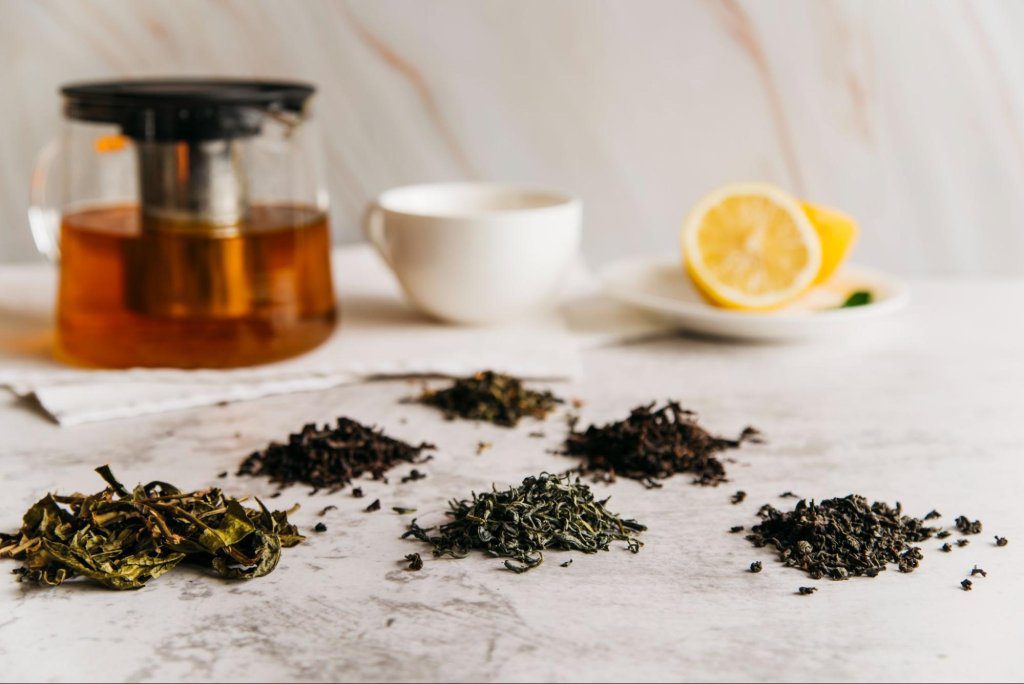History and Background of Black Tea
The history of black tea dates back to the Ming Dynasty in China (1368-1644). Its ability to be preserved for extended periods led to the creation of this flavourful tea, which quickly gained popularity. Black tea, made from the Camellia sinensis plant, is predominantly found in India and China. Its signature dark colour and malty, fragrant taste result from oxidation, a process that occurs when the leaves of the Camellia sinensis plant are exposed to air.
In this article, we will delve deeper into the benefits of black tea, the process of making it, the optimal storage conditions to preserve its quality, its caffeine content, and more!
Why Black Tea is Popular in Malaysia?
In Malaysia, black tea is more than just a beverage; it’s part of our culture. It’s the drink of choice for catching up with friends or celebrating special moments. The deep flavours bring people together, making every sip enjoyable. Malaysians love black tea for its bold taste and the comforting moments it brings. In fact, over 80% of the tea consumed is black tea, compared to other types. This clearly shows how much Malaysians appreciate it.
How is Black Tea Made?
Black tea is crafted through a meticulous process that distinguishes it from green tea. Unlike green tea makers, who preserve the green chlorophyll in the leaves, black tea makers allow the leaves to undergo a natural transformation. This transformation involves oxidation, a process similar to the one that causes bananas to turn brown. As the leaves oxidise, they develop a rich, dark colour.
This oxidation process not only alters the appearance of the leaves but also plays a crucial role in enhancing the tea’s flavour and aroma. During oxidation, the leaves produce compounds called flavonoids, which are responsible for the tea’s intense taste and aromatic profile. The longer the oxidation, the more pronounced these characteristics become, resulting in the distinct and robust flavour that black tea is celebrated for. This careful balance of time and environmental conditions during oxidation is what gives black tea its unique and beloved qualities.
The Benefits of Black Tea
Black tea is one of the most popular beverages worldwide, known for its rich flavour and numerous health benefits. The benefits of black tea are highlighted below:
- Alertness and Energy: Black tea contains caffeine, a natural stimulant that enhances alertness, concentration, and mood. It provides a moderate caffeine boost compared to coffee, making it a preferred choice for sustained energy throughout the day.
- Antioxidants: Black tea is rich in polyphenols and catechins, which are potent antioxidants. These compounds help neutralise harmful free radicals in the body, reducing oxidative stress and lowering the risk of chronic diseases.
- Possible Anti-Cancer Effects: The antioxidants in black tea, such as theaflavins and thearubigins, may have protective effects against certain types of cancer. These compounds help inhibit the growth of cancer cells and promote apoptosis (cell death) in cancerous cells.
- Heart Health: Regular consumption of black tea has been associated with improved heart health. It may help lower LDL (bad) cholesterol levels and increase HDL (good) cholesterol levels, thus reducing the risk of heart disease. The flavonoids in black tea also support healthy blood vessel function, improving circulation and reducing the risk of hypertension.
- Improved Metabolism: Black tea contains compounds like theaflavins and catechins that can boost metabolism. By enhancing metabolic rate, black tea may aid in weight management and promote fat oxidation, contributing to healthy weight loss when combined with a balanced diet and regular exercise.
- Gut Health: Polyphenols in black tea, particularly tannins, have prebiotic properties that support the growth of beneficial bacteria in the gut. These bacteria, such as Lactobacillus and Bifidobacteria, contribute to digestive health by maintaining a healthy balance of microorganisms in the intestines. This can improve digestion, reduce inflammation, and enhance overall gut function.
Though the benefits of black tea are plenty, it’s important to consume it in moderation. Many of the potential negative effects associated with black tea, such as caffeine sensitivity and bone health concerns, are primarily linked to overconsumption. When enjoyed in moderate amounts as part of a balanced diet, black tea can be a delightful and healthful addition to your daily routine.
In addition to its health benefits when consumed, black tea offers versatile uses for personal care and culinary purposes. Cooled black tea bags can be applied to tired or puffy eyes to reduce swelling and rejuvenate the under-eye area. As a natural hair rinse, cooled black tea adds shine and strengthens hair strands post-shampooing.
You can also freeze brewed black tea into ice cubes and incorporate them into beverages for a refreshing twist with added antioxidants. Furthermore, use concentrated brewed black tea as a marinade for meats or as a flavorful addition to sauces and dressings, enhancing dishes with its robust taste and beneficial properties.
What is the Ideal Storage Condition for Black Tea?
To preserve the rich flavour and aroma of black tea, proper storage is essential. The best way to store black tea is in an air-tight container placed in a dark place, protecting it from light, air, and moisture, which can degrade its quality. Once brewed, it is advisable not to leave the tea out for more than a few hours to maintain its freshness and prevent spoilage.
Typically, black tea retains its best quality for six months to a year, although this can vary based on storage conditions. When storing it, the relative humidity should be kept below 75%, and the temperature should ideally be between 30 ºC and 45 ºC and 45ºC. Following these guidelines ensures that your black tea remains fresh and flavourful for as long as possible.
How the Caffeine Level of Black Tea Can Change
Interestingly, the duration for which black tea is stored can also impact its caffeine levels. During the drying process, caffeine levels may drop due to sublimation, where the caffeine transitions directly from a solid to a gas and dissipates. However, if black tea is stored for more than six months, observations indicate that the caffeine levels can increase. This counterintuitive phenomenon suggests that the compounds in the tea continue to interact and change even after the initial drying process, potentially concentrating the caffeine content over time. Therefore, while fresh black tea might have lower caffeine levels immediately after drying, longer storage periods could result in a more caffeinated brew. This underscores the importance of proper storage to manage not just flavour and aroma but also the caffeine content of black tea.

Discover CHAGEE Series of Black Tea in Malaysia: Your New Favourite Drink
Hello, tea lovers! If you’re looking to try something new, black tea is the perfect choice. With its strong flavour and energising qualities, it’s becoming a favourite here in Malaysia.

Dive into the refreshing boldness of the CHAGEE Ceylon Black Tea series
Get ready to savour the bold and refreshing taste of CHAGEE’s Ceylon Black Tea series! With its smooth, malty infusion and luscious fruity notes, each sip is pure indulgence. Choose from our two exciting flavours – Ceylon Black Milk Tea or Ceylon Lemon Black Tea – and experience a tea journey like no other. It’s time to treat yourself to something truly unforgettable!

Indulge in the Experience with Lapsang Souchong Black Milk Tea
Craving a cup of black tea? Look no further! Explore our new addition to our milk tea series, the Lapsang Souchong Black Milk Tea, and immerse yourself in a world of robust flavour and aroma. At CHAGEE, we are committed to providing you with a diverse menu of teas to cater to your palate. Whether you’re a tea aficionado or a casual sipper, we have something for everyone. Embrace the rich heritage, tantalising flavours and healthy properties of black tea with us, and elevate your tea-drinking experience to new heights.

